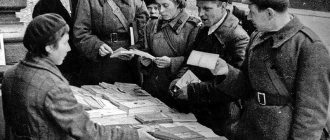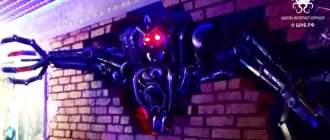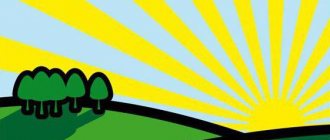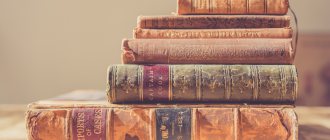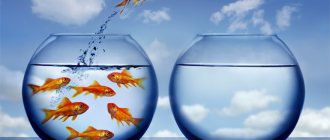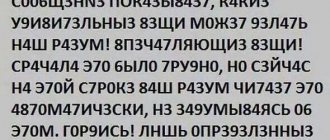Tips on how to start reading more
- Record every book you read. This will make it easier to track your progress and understand how much more you should be reading. By tracking how much you read in a month or a year, you will understand that there is not so much and motivation and even a kind of excitement will appear to increase this number. It is convenient to use reading trackers for this.
- Set a goal for the year. Everyone has their own limit. For some, 20 books a year is an achievement, while others consider 150 books a year to be insufficient. The main thing is to determine what you are aiming for. Having a goal in itself motivates action, and it is also important to correctly formulate the goal and write it down.
- Don't waste time and money on nonsense, read only worthwhile works. Selecting reading material for leisure is a very important and scrupulous process. If you don’t choose carefully, several days of your life will simply be lost. Always allow enough time to search for a good piece. View reviews, ratings, get acquainted with annotations and opinions of other authors and critics. If the first pages of a book don't pull you in, then it might not be to your taste at all. Write down a list of books you plan to read in your planner or notes on your phone, and when you go to the bookstore, don't forget about it.
- Buy a book. I mean a paper book, with a cover and other goodies. Reading a paper book is a special pleasure. They smell nice and there is no risk of being distracted by a message popping up from the messenger. But in addition, books made of flesh have a beneficial effect on the cognitive functions of the brain, since reading trains fine motor skills.
- Set yourself a daily minimum. Let it be 20 pages a day, 50, or even 100. How long can it take to read 100 pages? If desired, in just a couple of hours. But this is already depends on your goal for the year. You need to regularly increase this minimum in order to read more and more books.
- Make a list of books to read. If we are talking about non-fiction books, then it is useful to divide the list into categories related to areas in which you want to deepen your knowledge. You can be inspired by the advice of famous successful people in order to learn something interesting and new for yourself by comparing it with the person who recommended this work. Place the list somewhere conspicuous so that the question “What should I read?” disappeared immediately.
- Use a psychological trick. Imagine if there was an apocalypse in a few months, you would die, what books would you read then? This will help determine your true desires , and not what you think you should read.
- Set aside dedicated time in your schedule for reading. This will help you organize your time without sacrificing reading; rather, you will have to adjust other items so that you always have enough for books. Consider it as unshakable as going to the dentist.
- Buy and collect paper books, even if you don’t have time for them yet. They won’t run away anywhere, and will simply silently wait in the wings on the shelves. You can get into the habit of buying a book every month.
- When you need to read a book, but the process doesn’t go well. Sit with a book for a few minutes, doing nothing, with the cover closed. At some point, your hands will reach out to open the hostile book and read it.
- Read consciously. Social networks are filled with reposts of texts with enticing headlines. The number of tabs in your browser multiplies, and your ability to focus on information weakens. You read 50 articles a day, without really delving into anything, getting only a momentary thrill, and practically nothing remains in your head. To benefit from reading, you need to read according to the list. And it’s better to spend time on books that you chose consciously, rather than absorb tons of information garbage that the media shoves down your throat.
- Add some fun. Read what brings you pleasure. If a person says that he doesn’t like to read, it means he simply hasn’t found his book or author yet. Read books related to topics that interest you.
- Set a deadline for reading the book. Decide to yourself how soon you want to finish this book. And knowing a certain number, you are less likely to succumb to procrastination. It will be like a small promise made to yourself. And promises cannot be broken, even to yourself.
- Go to the library. If you need a quiet atmosphere for reading, almost all libraries have reading rooms. And if you take the book with you, libraries usually have a return period, often about two weeks. Try to read it, otherwise it will be a pity to return the book unread, or you will feel embarrassed in front of the library staff for why you are renewing the book. After all, two weeks was more than enough to read it.
- Make a bet or state your goal in some way. For example, “If I don’t finish reading 100 books by the end of the year, I’ll donate my favorite book to the library.” The Smartprogress service has such functionality as , which will help you achieve your goals.
- Organize your time. Think about what useless activities you can take a couple of extra hours of reading from. It is unlikely that scrolling through a feed or watching TV can be considered a fruitful pastime, which means this time can be given to reading.
- If you have very little time, read stories. They are easy to read in one sitting and are not very energy intensive. Chekhov, O. Henry, Edgar Allan Poe, Murakami, Twain...
- Start reading the next book on the list as soon as you finish reading the previous one. Don't take breaks between books. You need to read at least a couple of pages on the same day, so that the next day you already have the feeling of starting something, but not finishing it.
- Bonus motivation. Your surroundings may be inspired by your successes and start reading too; you will become a good example for them. This is both pleasant and useful. Especially considering how few people read books these days.
- Give yourself an incentive to read. List the advantages of reading books, what they can give you if you start devoting more time and effort to this activity. You will become more literate, it will be more interesting to have conversations with you, and you will improve your erudition. Just imagine for a moment what success you will achieve and how much new knowledge you will gain if you read 1000 quality books in the next few years. Keep a diary of your achievements and record your reading progress.
- Organize yourself a comfortable place to read. Reading in bed is not a good idea, because the bed is perceived by our brain as a resting place, which means there is a high risk that this reading will not be productive for you. Prefer a chair at the table or a sofa.
- Lighting is important. Don't jeopardize your eyesight by reading books in poor light. Moreover, good consecration will not allow you to nod off, losing the meaning of what you read.
- Read in a comfortable position. If you hunch over and generally position your body in an incomprehensible way, you won’t be able to read for long. And even if you can, your shoulders, back and neck are unlikely to thank you and may even lead to problems with blood circulation and headaches.
- Use special glasses when using the computer. They prevent bright light from irritating your eyes. Let them always be in view of the monitor so that you can reduce fatigue and preserve your eyesight.
- Take breaks every half hour. Try to alternate reading with physical exercise. In this case, the brain will rest, and the body will work a little to stay in good shape longer. Turn off all unnecessary thoughts, breathe carefully and correctly to saturate your brain with oxygen. Even just getting up from a chair from time to time will not be without benefits.
- Give your eyes a rest periodically. If you feel that your eyes are tired, do the following exercise: rub your palms and close your eyes so as to ensure complete darkness. Peer at a point in the middle of the blackness, as if trying to see something through this curtain. This will help relieve eye tension.
- Learn to speed read. At some point you will be able to tell good books from bad ones. Therefore, it is worth taking the time to learn how to speed read so that you can read as much as possible. The fast reading technique will allow you to understand most of the information at high speed. Move your finger across the book
- Cut off the left and right 15% of the page
- Read with 80% comprehension
Books on self-knowledge and self-improvement
Now we will move on to examples of books that touch on the topics of self-knowledge, self-development and self-improvement and are useful for general education. I will divide the lists into two blocks, according to the stylistic complexity of reading.
A list of literature that is stylistically very pleasing to the eye and easy to read
From fiction:
- Flowers for Algernon - D. Keyes.
- How steel was hardened - N. Ostrovsky.
- The Little Prince - Antoine de Saint-Exupéry
- Divine Comedy - A. Dante.
- Book of Mirdad - M. Naimi
- The language of birds - A. Navoi.
- Rubai - O. Khayyam.
Basic literature:
- In simple words about mindfulness - G. Henepola
- Triple wisdom - R. Blackt.
- The art of controlling destiny - Sun Light.
- The richest man in Babylon is D. Clason.
- The art of loving - E. Fromm.
- The Tao of Winnie the Pooh - B. Hoff.
- About good deeds - L. Seneca
In-depth literature and primary sources:
- Tao Te Ching - Lao Tzu
- 2. The Art of War - Sun Tzu
- 3. Sri Ishopanishad
- 4. Sutta Nipata
- 5. Subjective evolution of consciousness - B.R. Sridhar Maharaj.
A list of references written in complex stylistic text.
Artistic:
- Father Sergius - L. Tolstoy
- Martin Eden - D. London
- Faust - I. Goethe.
- Oblomov - I. Goncharov.
- Mtsyri - M. Lermontov.
- Woe from Wit - A. Griboyedov.
- No change on the Western Front - E. M. Remarque.
Basic:
- The Seven Habits of Highly Effective People - Stephen Covey
- Fear and Trembling - S. Kierkegaard.
- Willpower - K. McGonakal.
- Super Thinking - Tony Buzan.
- Confession - Leo Tolstoy.
- Book of Five Rings - Miyamoto Musashi
- Hagakure - Yamamoto Tsunetomo.
- On duties, old age and friendship - Marcus Tulius Cicero
In-depth literature and primary sources:
- Bible
- Koran
- Bhagavad Gita
- Mahabharata - Srila Vyasadeva
- Sri Chaitanya Charitamrita - Krishnadas Kaviraja Goswami.
- Srimad Bhagavatam - Srila Vyasadeva.
- Nicomachean Ethics - Aristotle.
- Dialogues - Plato.
50 page reading rule
The fact that any book you read increases your level of intelligence is an undeniable fact. So count how many books you need to become twice as smart. Only 100. Quite doable.
Here you should resort to the 50 page rule. Read the first 50 pages, and if the book drags on with boring language and plot, just put it down. Maybe later you will return to it or give it to someone who will like it more.
Only a few percent of the books published each year turn out to be worthwhile. But even this figure will be unaffordable for you. Therefore, use this rule and read only what will hook you.
Learning to remember what you read
If you study a lot, but almost none of it sticks in your head for long, it's something you need to work on.
Learning to remember information from books.
- Relax with your favorite novel or detective story in a calm and comfortable environment, without distractions. It is ideal to do this in the morning, before work, when the brain is not yet overloaded with information.
- Discuss what you read. Promote the plot of the book to your friends. It will benefit you and they will likely want to read it.
- Take notes. I like to highlight important points in the text, underlining them, and stick a sticky note on the desired page, or take screenshots or write down phrases. Based on your notes, it will not only be easier to remember the essence of what you read, but also to find answers to your questions.
- Train your memory. To better retain in your head the information you just received, try to train your memory. Learn poetry by heart, sign up for special courses. Also, Vikium memory simulators are an excellent option. They help me out, because due to my workload I don’t have the opportunity to attend courses, and setting aside 15 minutes a day to warm up my brain is always possible.
- Understand the plot. You must understand and be aware of what we are talking about.
I started using these rules after I wanted to tell a friend the plot of a book that inspired me. But I realized that I don’t remember half of it. And how to retell it? In order not to get into such a situation again, I began to solve the problem, and now I remember everything in detail!
- How to learn to remember large amounts of information: 10 powerful methods + memory training course
Also on our blog there is a selection of the 11 best speed reading courses.
Check out 11 courses →
How to learn to read faster
Everyone has their own reading speed. There is no need to strive for the results of Guinness World Record holders. You just need to increase your speed a little. Once you master the right techniques, you will be able to read faster without losing the meaning of the text.
Speed Reading Techniques
- Reading with your finger
Using this technique, we track reading speed using our finger. Move your finger along the lines as you read. Increase your speed little by little. This technique is characterized by a high degree of concentration.
- More words per glance
For faster reading, it is recommended to read a couple of words in one glance. This pace is easy to achieve.
- Fast pace
Read quickly even if you don’t have time to grasp the information, this will come with time. Your brain will adapt to the fast pace and will take in all the important information.
- Do not pronounce the text while reading
This habit is the hardest to break. Not everyone can achieve it to the end. But other techniques simply won’t allow you to speak the text. Each new step will help increase your speed.
Reading session of at least 15–20 minutes
- Don't read if you have less than 15-20 minutes to do so. Reading in fits and starts will force you to constantly return to what you have already read, wasting your time.
Roman Zhikharev: “I would generally say 60 minutes. Because for 20 minutes you just restore the context.”
Ever since my student days, a statistics textbook allowed me to fall asleep in 3–5 minutes.
Listen to audiobooks
I don't listen to very many audiobooks;
This is not my favorite method of consuming literature. But if I'm going on a long trip where I'll spend the most time driving, I'll buy a couple of books on Audible to pass the time. If you spend a lot of time on the road, your time behind the wheel can be a great opportunity to consume a large library of books. Pro Tip: Increase playback speed by 1.5 to 2 times. You will be able to understand everything, but this will allow you to finish the book faster.
Morning evening
In any activity, it is important that it brings not only benefits, but also pleasure. Books need to be felt. For example, you watch new TV series with great interest! And books are just as much entertainment. They, like TV series, are different, and you don’t have to love them all. One will give you a good time, and the second will give you deep knowledge in the field of physics, for example.
Therefore, it is better to read scientific literature (nonfiction) in the first half of the day (then your mind is clear and your thinking is clear), and fiction - after lunch and before bed (it perfectly helps you fall asleep quickly!). Adjust your reading speed depending on the type of information and the end goal. With every page you read, you will practice the fundamental skill of speed reading.
Take advantage of travel time
If you take the subway or bus to work, use this time to read.
Before our editor Jeremy started working for us, he rode the bus to work every day and used that time to read. During this time he read several books. My favorite time to read is on a plane. You'll be surprised how much you can read in an hour or two of flight without WiFi-dependent distractions. In this amount of time you can read the entire book. Short, of course. During the two-hour flights, I managed to read books such as The Road, The Great Gatsby, Death of a Salesman, Bhagavad Gita and The Innovator's Dilemma. Next time you plan to fly on a plane, don't load your phone with movies and apps, load it with books. Better yet, take one or two paper books with you.

